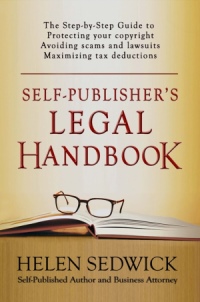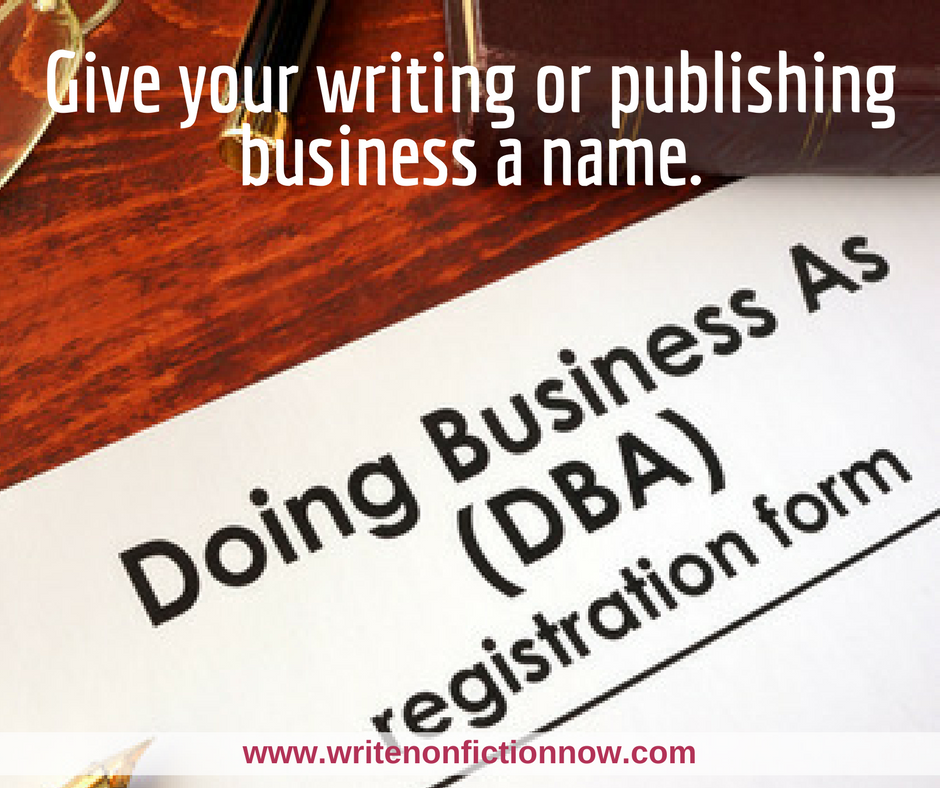Most writers function as sole proprietors and choose to “do business as” (DBA) whatever company name they create. Have you ever wondered what how a DBA name works or how to choose a name for your writing business? Today, author and attorney Helen Sedwick (@HelenSedwick) provides the information you’ve been looking for about DBAs. This post is the second in Helen’s series on the business side of writing and publishing.
In my last post, I focused on the tax benefits of treating your writing as a business. I also explained that forming a corporation or LLC was an unnecessary expense and offered little liability protection for most writers or independent publishers.
Wait. Isn’t that advice contradictory? Can you have a business that’s not a corporation or LLC?
Certainly. You can operate your writing venture the same way millions of small businesses do—as a sole proprietorship. They are simpler to operate than corporations and LLCs and are not taxed separately. However, even if your writing or self-publishing business is a sole proprietorship, I recommend you give the business a name, commonly known as a DBA, short for “doing business as.”
What is a DBA?
Some writers are confused by the idea of operating under a DBA name. Is that the same as setting up an entity? No.
A DBA is merely another name for you. I am known by various names: Helen Sedwick, Ten Gallon Press, and to some people Mom or Aunt Helen. But all of those names mean me. Same for you and your DBA.
Your company name is different from a pen name.
- A pen name is listed as the author of your books.
- A company name is your imprint name and is listed as the publisher of your books.
How to Choose a Name for Your Writing or Publishing Company
Choosing a company name is a creative process. Optimally, the name will imply some promise about your books, such as romance (Passion Press), adventure (Kick-Ass Books), travel (Rickshaw Riders), or life-changing insights (Next Chapter Publications). The name may include the word “company” but should not include Corp., corporation, or Inc. unless you have specifically set it up as a corporation.
Don’t lose sleep over choosing the perfect company name. Few people will remember the name, and it’s not as important as your book title or the names of the people in your memoir (or novel).
Don’t Use a Company Name Already in Use
 But take the time to choose a name that’s not already in use in the publishing or related business or your local community.
But take the time to choose a name that’s not already in use in the publishing or related business or your local community.
Using a company name that is already in use may lead to conflict if:
- The name or a confusingly similar name is already used by a similar business.
- The name is associated with a well-known brand, such as Starbucks, Sears, or Apple.
- Someone in your county is using the same name whether or not they are in a similar business.
How to Determine if Your DBA Name has a Previous Trademark
How do you determine if there is a conflict?
Search Registered Trademarks. Go to the US Patent and Trademark Office (USPTO) and conduct a search. If you find a registered trademark that is the same or similar to your company name, do not despair. Most of the time, you may use the same name as long as you do not “create a likelihood of confusion in the mind of the consumer as to the source of the product.”
Here’s an example:
I searched “Goody Two Shoes” and found one “live” registration by MaxWax Inc., for “hair removal services.” If you name your company Goody Two Shoes, you are unlikely to be infringing on MaxWax’s trademark because your products and services are different. However, if you find that your dream name has been registered as a trademark for anything related to writing, publishing or communications, don’t use it. You’re asking for trouble.
Search your state’s trademark database. In most states, you can search online. Again, apply the likelihood of confusion test before you use a trademark that is already registered.
Do not use a well-known trademark such as McDonald’s or Exxon even on a noncompeting product. Owners of strong marks have the right to challenge any similar trademark that may “dilute” the value of their trademark regardless of the product or service. Avoid this fight.
You are not done yet. Most businesses do not register their trademarks with the USPTO, so search for unregistered trademarks on Google, Bing, and other search engines. If you find a company using the name, apply the likelihood of confusion test. If the company is selling auto parts, then using the same name for your company is not likely to cause confusion and be considered infringement.
Also, search industry-related indexes such as Literary Marketplace and Poets & Writers Magazine Directory of Small Presses. Searching domain names will also alert you to other possible users.
Search your county’s index of Fictitious Business Name Statements. Many counties have online databases.
Legally, you may not use a DBA already in use in your county whether or not the businesses are the same. Although DBA laws are not generally enforced by governmental agencies, the owner of the existing business could complain and make you change your business name.
For example, suppose you want to call your company Three Little Pigs Press. My search of the USPTO and the internet found many users of that name, but all were related to food products, not publishing. No problem there. But suppose you find a butcher in your county with the registered DBA, Three Little Pigs. Because you would be using the same DBA in the same county that butcher could stop you from using Three Little Pigs even though you are in different businesses.
Yes, I know this is confusing. But that’s the law.
Make your Writing or Publishing Company Name Official
Once you have decided on a company name, let’s make it yours officially.
File a Fictitious Business Name Statement (FBN Statement) in the county where your business will be located. For most of us, this is our home.
 In most states, you may not operate under a business name unless you file an FBN Statement within sixty days of starting the business. Practically speaking, you won’t be able to cash a check made out to your business name unless you have filed an FBN Statement.
In most states, you may not operate under a business name unless you file an FBN Statement within sixty days of starting the business. Practically speaking, you won’t be able to cash a check made out to your business name unless you have filed an FBN Statement.
Some people will call this a DBA (doing business as) filing. It’s simple and inexpensive. Search “fictitious business name” and the name of your county. You will find services that handle the process, typically for less than $100. Handling the filing yourself won’t save much money, so let the experts take care of it and save your energy for writing.
About a month after you submit your FBN Statement, you will receive a certified copy of the statement. Keep it in a safe place. You will need it to open bank accounts.
In my next post, I will walk you through the process of getting your Employee Identification Number (EIN) and business licenses.
About the Author
 Helen Sedwick is an author and California attorney with thirty years of experience representing businesses and entrepreneurs. Publisher’s Weekly lists her Self-Publisher’s Legal Handbook as one of the top five resource books for independent authors. Her blog coaches writers on everything from saving on taxes to avoiding scams. For more information about Helen, check out her website at helensedwick.com.
Helen Sedwick is an author and California attorney with thirty years of experience representing businesses and entrepreneurs. Publisher’s Weekly lists her Self-Publisher’s Legal Handbook as one of the top five resource books for independent authors. Her blog coaches writers on everything from saving on taxes to avoiding scams. For more information about Helen, check out her website at helensedwick.com.
Disclaimer: Helen Sedwick is an attorney licensed to practice in California only. This information is general in nature and should not be used as a substitute for the advice of an attorney authorized to practice in your jurisdiction.
Photo courtesy of Vitaliy Vodolazskyy / 123RF.com.

Annmarie Thomas says
Hi
Is using my maiden name combined with my married not a good idea for my DBA publishing company? Thomas & Frazier Press, is a good title?
Nina Amir says
That’s up to you! There is no right or wrong, good or bad…just the publishing company name you feel best describes what you do or serves your purpose.
Student says
Does a DBA cost anything? Where can I go to file this paperwork?
Nina Amir says
There is a small fee. You need to go to your city government offices to apply.
Ioannis says
thank you for this helpful post!
Carolyn Erickson says
Thank you for sharing!
If I reside in the US, incur most business related expenses in the US, but my book(s) will be sold outside the US, is there anything I need to be aware of legally?
Thank you,
Carolijn
Nina Amir says
There may be issues, but I am not a literary or IP attorney. I can’t advise you! I’m sorry.
Monica Pierce says
I have a sole proprietorship set up for my consulting/freelance services business (including a DBA, EIN plus business insurance), under which I manage all my business-related expenses and income. I planned to self-publish my first book this January, “under” my business. But I just realized I don’t know how to technically do that. Is it when I get the book copyright, does it have to be in the name of my business? I wasn’t planning on setting up my own imprint but is that the only way to have the book technically published “under” my business? If so, my DBA, Monica Pierce Services, is not conducive to a publishing imprint. Should I change it? Or get a second DBA specifically for my self-published books (and use the original for other freelance work)?
Helen Sedwick says
Monica, You can use your existing DBA and sole proprietorship for your imprint. The copyright would still be in your personal name. Think of a DBA as just another name you go by, but it’s still just you.
If you were to set up an LLC or a corporation to be your imprint, then you would “assign” the copyright to that entity. But it’s rare for a writer to see to set up such a complicated structure.
Let me know if you have more questions.
Helen Sedwick
Audrey S says
I really don’t know what to name my company; can I have some help? My name is Audrey, but I don’t want to put that in the name. I thought of Bluebird Publishing, but that name was taken. Can I have some ideas like that?
Nina Amir says
Pick a name that means something to you.
Audrey S says
Hello, it’s me again! Thank you for responding to my comment! I couldn’t think of a name that really meant something to me, but I loved your advice! So I took some time alone with just my thoughts, and came up with ‘One Word Publishing House.’ Do you think that sounds authentic?
Daniel DuBois says
Thank you for this post, I am in the midst of, as my wife says “figuring out the author thing” The first two books are done, what next? DBA or LLC? Indy or publishing house? Self-editing or professional editor? It all seemed easy sit down write the book the words flowed no this is frustrating. Thanks for letting me vent and thanks for your site.
Priscilla says
Where were you 6 months ago!!! I tried researching the name I wanted for my business, the search came back available so i got the LLC and got my first 2 books published with Kindle books. Got a web site set up, now I find there is another company same name similia interest, not exactly the same but close enough so I’m not happy with it. I’m thinking about starting over, changing my publishing name, but with books already out there how do i go about doing that. Will it be more trouble than it’s worth? I also did not realize soul proprotor was that different for llc. so now want to check that out a little more. Thanks for your great article. Finally, someone who knows a little something and is not afraid to share.
Nina Amir says
I’m not a lawyer or accountant, so I can’t advise you on the whether you need an LLC or sole proprietorship. I know an LLC offers more protection. If the names of the companies are different…even if not by much…is it worth the trouble to change it?
And…I was here. Have been here for many years. 🙂
Stan says
Thank you for your posts.
I created a publisher name years ago without trademarking it. A year ago someone trademarked that term and caused all my books to be unpublished even though I wrote them. I can only trademark terms or imprints that aplly to my own country. I am however going to create my own publishing company with perhaps a name no one would want to steal.
Do you have any tips and advice as to how
I can prevent this from happening again? Would it help to exclude all publishing imprints and logos on covers and copyright pages?
Nina Amir says
I’m sorry that happened to you, but I don’t have tips. I’d ask a literary attorney.